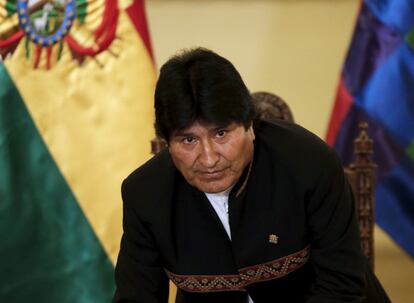Bolivia votes ‘no’ to allowing President Evo Morales to run again
Final official count in referendum shows 51.30% rejected altering the Constitution

Bolivia has voted against a proposal that would have allowed President Evo Morales to run for an unprecedented fourth term in 2019, official results show.
After a count lasting more than 48 hours, the country’s Electoral Tribunal released the final tally from Sunday’s referendum, which showed that 51.30% of Bolivians voted against changing the Constitution while 48.70% said “yes” to Morales’ re-election bid.
The outcome marks the biggest political setback and first electoral defeat for the leftist Aymara Indian leader since he came to office in 2006. If he had won the referendum and was re-elected, Morales would have been able to remain in office until 2025.
The issue had greatly divided Bolivians, but exit polls on Sunday revealed that the president had narrowly lost the referendum.
The outcome marks the first electoral defeat for the leftist Aymara Indian leader since he came to office in 2006
“Life goes on and the fight continues,” Morales said on Monday after learning the preliminary results.
Even though Morales has been credited for the social progress and development Bolivia has enjoyed over the past decade, a string of corruption scandals involving his Movement for Socialism (MAS) party has angered many people.
One of the highest-profile cases involved the Fondo Indígena (Indigenous Fund), a public entity set up to help rural communities that is run by various union leaders, including MAS officials. According to conservative estimates, around $30 million has been diverted from the agency over the years.
What embarrassed the Morales government was that the union leaders ostensibly spent the money without any consideration for the indigenous communities, who were watching what was happening.
Morales was also caught up in a personal scandal – perhaps the biggest controversy in his political career – when he admitted that he had had a romantic relationship with Gabriela Zapata, a lobbyist for Chinese companies that hold investments in Bolivia. The unmarried president had a son, who later died, with Zapata.
Corruption and personal scandals did not help Morales win votes in the referendum
While the government tried to play down suggestions of influence peddling, the scandal directly marred Morales’ image.
The president accused the opposition of launching “a dirty war” against his administration with the help of the United States.
The economy has also taken its toll on the Morales administration. The fall in the global price of oil has affected Bolivia, which is a supplier of natural gas to its neighboring countries.
English version by Martin Delfín.
Tu suscripción se está usando en otro dispositivo
¿Quieres añadir otro usuario a tu suscripción?
Si continúas leyendo en este dispositivo, no se podrá leer en el otro.
FlechaTu suscripción se está usando en otro dispositivo y solo puedes acceder a EL PAÍS desde un dispositivo a la vez.
Si quieres compartir tu cuenta, cambia tu suscripción a la modalidad Premium, así podrás añadir otro usuario. Cada uno accederá con su propia cuenta de email, lo que os permitirá personalizar vuestra experiencia en EL PAÍS.
¿Tienes una suscripción de empresa? Accede aquí para contratar más cuentas.
En el caso de no saber quién está usando tu cuenta, te recomendamos cambiar tu contraseña aquí.
Si decides continuar compartiendo tu cuenta, este mensaje se mostrará en tu dispositivo y en el de la otra persona que está usando tu cuenta de forma indefinida, afectando a tu experiencia de lectura. Puedes consultar aquí los términos y condiciones de la suscripción digital.








































